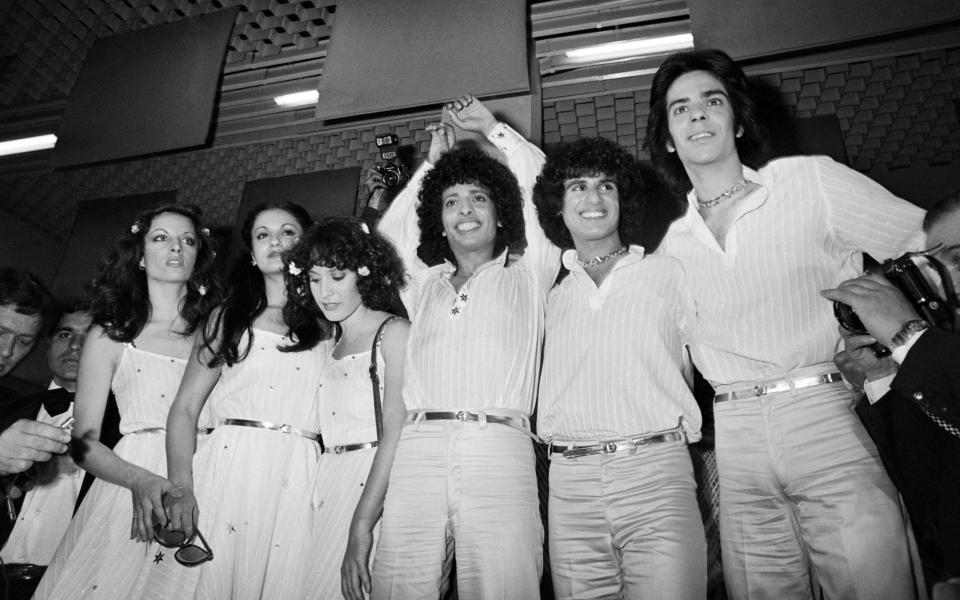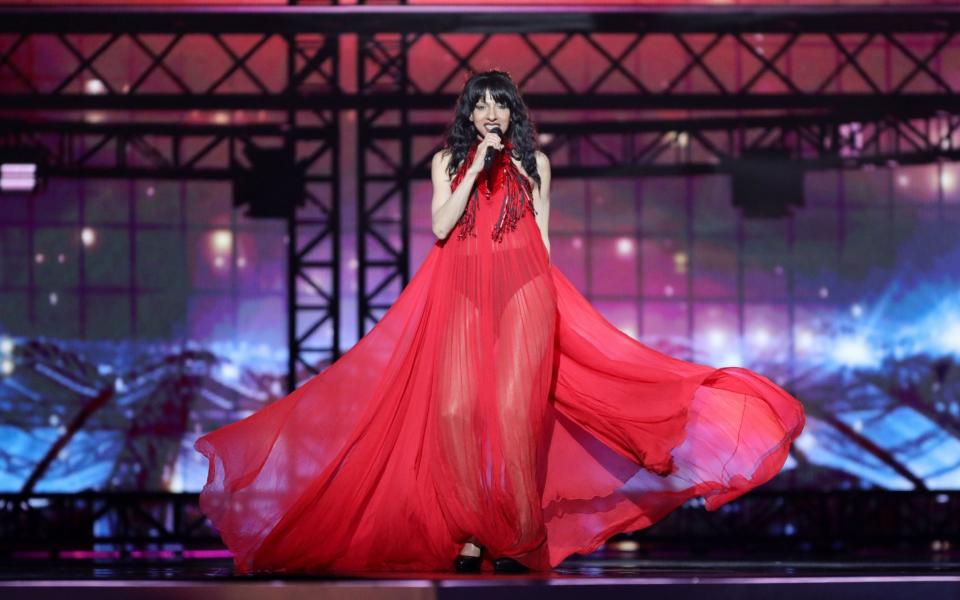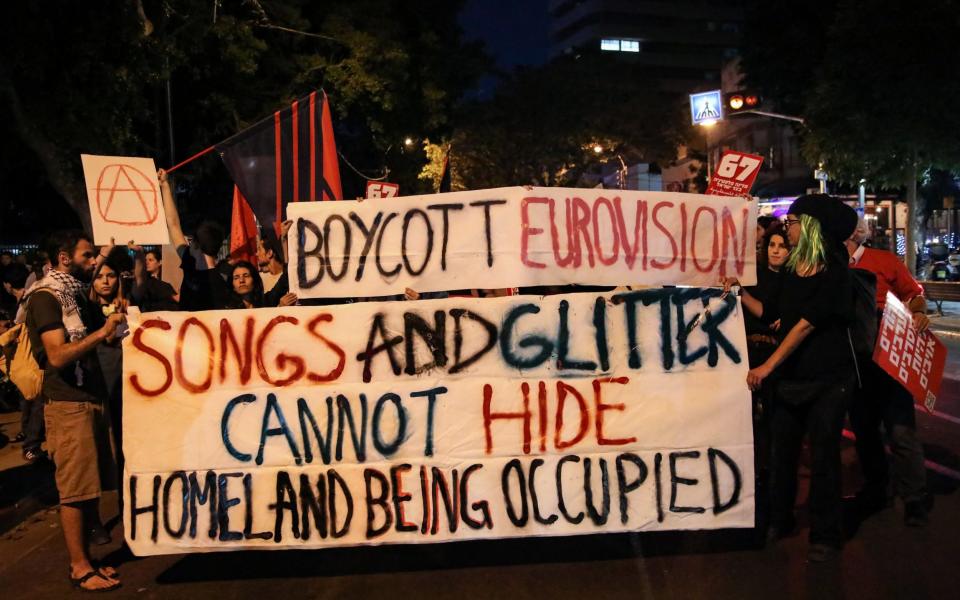Inside Israel’s controversial, often dangerous relationship with Eurovision

Eurovision was never meant to be like this. A festival of frivolity, humour, inclusivity and campness with a dollop of music thrown in, yes. But a toxic, politically-charged, violent and dangerous tinderbox? No. But this is just what has happened in the Swedish city of Malmö due to deepening resentment over Israel’s presence in this year’s competition.
Israel’s contestant Eden Golan was booed on stage during a dress rehearsal on Wednesday, even though her song Hurricane has since made it through to Saturday night’s final. But it is what’s happening outside the Malmö Arena that is more concerning. Thousands of pro-Palestinian protestors have gathered in the city’s streets, setting off smoke canisters in the colours of the Palestinian flag and blocking the Øresund Bridge between Malmö and Copenhagen, where lots of fans are staying.
Armed police, with whom protestors have clashed, are positioned outside Golan’s hotel, where she is confined to her room when she’s not performing. Golan’s security arrangements are being handled by Ronen Bar, the head of Shin Bet, who flew to Sweden to ensure her safety.
The protests are about the worsening humanitarian situation and thousands of civilian deaths in Gaza. While the European Broadcasting Union (EBU), the organisation which hosts the event, has ruled that Israel is allowed to compete, many thousands feel otherwise – including, it seems, her fellow contestants. The situation is showing no sign of calming down. Israeli Prime Minister Benjamin Netanyahu sent Golan a message on social media, telling the 20-year-old that she is successfully standing up to “an ugly wave of antisemitism”. “Know that when people yell ‘boo’ at you, we shout ‘hooray’,” he said.
But Israel has always had a complicated relationship with Eurovision, which it has won four times. Issues of geopolitics, identity and good old-fashioned mickey-taking have coloured its entries down the years. Some of the controversy has stemmed from the simple question of why the country is allowed to compete in the contest at all – it doesn’t take a degree in geography to spot that Israel is nowhere near Europe. The answer is that Israel was allowed to join in 1973 because its state broadcaster was an active member of the EBU. Indeed, Eurovision has very little to do with geography – Australia has participated nine times.

Israel’s opening contest, in Luxembourg, was tense. It took place just seven months after the 1972 summer Olympics in Munich, during which Palestinian militant group Black September killed two members of the Israeli Olympic team and took nine others hostage. Security was so tight in Luxembourg that the late Terry Wogan recalled that the floor manager advised audience members to remain seated lest they were shot by protective snipers. One assumes he was joking but you never know.
The country had a hot streak in the late Seventies, winning in both 1978 and 1979. Israel’s first win caused a few problems in neighbouring Jordan, though, where authorities refused to broadcast the Israeli song, a lively number called A-Ba-Ni-Ba by Izhar Cohen and the Alphabeta (I’d advise watching it, but you’ll need a lie-down afterwards). Rather than show the entry, Jordanian TV broadcast an image of flowers instead. When Israel won, Jordan cut the TV feed altogether and claimed that second-place Belgium had triumphed.
Israel’s invasion of Gaza and the October 7 Hamas attacks in Israel that preceded it have stirred up the kind of deeply-held and conflicting emotions that are usually anathema to the singing competition. Back in November, the transgender Israeli singer Dana International, who won Eurovision in 1998 with the song Diva and has been a staunch advocate of her own identity, delivered a strong message to her 115,000 Instagram followers.

“Are you aware that if you [the LGBQT community] accidentally end upon the streets of Gaza, you won’t get out of there alive? Do you know that hamas [sic] sentences every LGBQT to death by hanging (if not worse)?” Dana wrote, adding: “If you do not condemn Hamas, you are against LGBQT, against women and AGAINST PEACE. Free Palestine – from hamas [sic].”
Her post caused an impassioned and occasionally vitriolic debate among her followers. Just weeks before, Dana had posted an old video of her lavishly choreographed performance of a song called Free, in which she was surrounded by hundreds of colourfully-dressed dancers. The contrast couldn’t have been greater.
Away from the politics of Dana’s November post, there is a broader issue about tolerance missing from the current controversy. Eurovision has always embodied inclusivity and acceptance when it comes to its performers. These values are what has allowed the contest to flourish and thrive among once-marginalised subcultures. But tolerance and acceptance – in the context of Golan’s Eurovision performance – seem entirely lost among protesters in Malmö this weekend.
Should an individual performer be a lightning rod for a far bigger issue over which she has no control and for which she bears no responsibility? Anti-Israeli critics have accused the country of “pinkwashing”, or using Eurovision as a cover for atrocities happening in Gaza. But I imagine that the 20-year-old singer cooped up in her hotel room feels differently.

It has always been thus. Even when Israel has hosted Eurovision, it has been subject to protests. When it hosted the event in Tel Aviv in 2019 after winning the previous year, protests took place in Jerusalem, where clashes occurred between security forces and Ultraorthodox Jews who objected to the fact that the final was being held on the Sabbath. And in the West Bank and Haifa, an Israeli city with a sizeable Arab population, Palestinians held an alternative Eurovision called “Globalvision” which featured Palestinian singers in an effort to draw attention to the Israeli occupation of their territory.
But Eurovision has often been politicised, and Israel is far from alone in feeling this. The UK’s 1981 winners Bucks Fizz told me a few weeks ago that they were subject to IRA threats when they appeared in Dublin. The band were put in a separate hotel from everyone else, they each had a bodyguard stationed outside their room, and they were accompanied everywhere by police outriders. Security intensified after they’d won. “All of a sudden we were surrounded by every single security guy there and the other participants had no-one to look after them anymore. They thought, ‘The UK won this, there’s going to be trouble,’” said Bucks Fizz’s Mike Nolan.
There is, though, one year in which Israel’s complicated relationship with Eurovision really came to the fore more than ever, largely due to its own song selection. In 2000 a band called PingPong were selected to represent Israel. The band’s song was called Sameach (Hebrew for “be happy”) and was a blatant attempt at cheesy Gina G-style Europop (it actually sounds like a very bad rip-off of G’s Ooh Aah… Just a Little Bit). It was sung with gusto and dubious tuning by a smiling male and female group who looked like they might have been taking the mickey.
Around the time of the 2000 contest, relations between Israel and Syria were delicate: the countries were negotiating about the contested area of the Golan Heights. But in the song, PingPong sang about a person from Damascus who was dating an Israeli girl, and at the end of the dress rehearsal the band waved Israeli and Syrian flags, which they said were meant to signify peace. Back home, the Israeli Broadcasting Authority (IBA) were angry that the context was being politicised and told PingPong not to repeat the move in the final.
The group refused to change their routine and were disavowed by the IBA. Then they repeated the stunt in the final. Hundreds of Israelis complained to the country’s Channel 1, politicians criticised the band and the IBA accused them of causing “antagonism throughout the world”. PingPong came 22nd and scored just seven points. PingPong member Roy ‘Chicky’ Arad was, the wider world later learnt, a poet, artist and political activist. The whole thing seemed like a situationist art stunt, just the kind of thing that clever students might dream up in the pub.
The PingPong story seems like a merry jape compared to what is happening today. There is a real danger that the protests in Malmö will mar this weekend’s final. Indeed, rarely has Eurovision been so riven with discontent. However there are suggestions that the anti-Israel sentiment may yet remain outside the arena and not affect the voting patterns of the judges and the public.
At time of writing and despite everything, Israel are bookies’ second favourites to win this year’s Eurovision, behind Croatia’s song Baby Lasagna. Such an outcome would suggest that the world of Eurovision is at least partially immune from a world riven with hatred and division.


 Yahoo News
Yahoo News 
